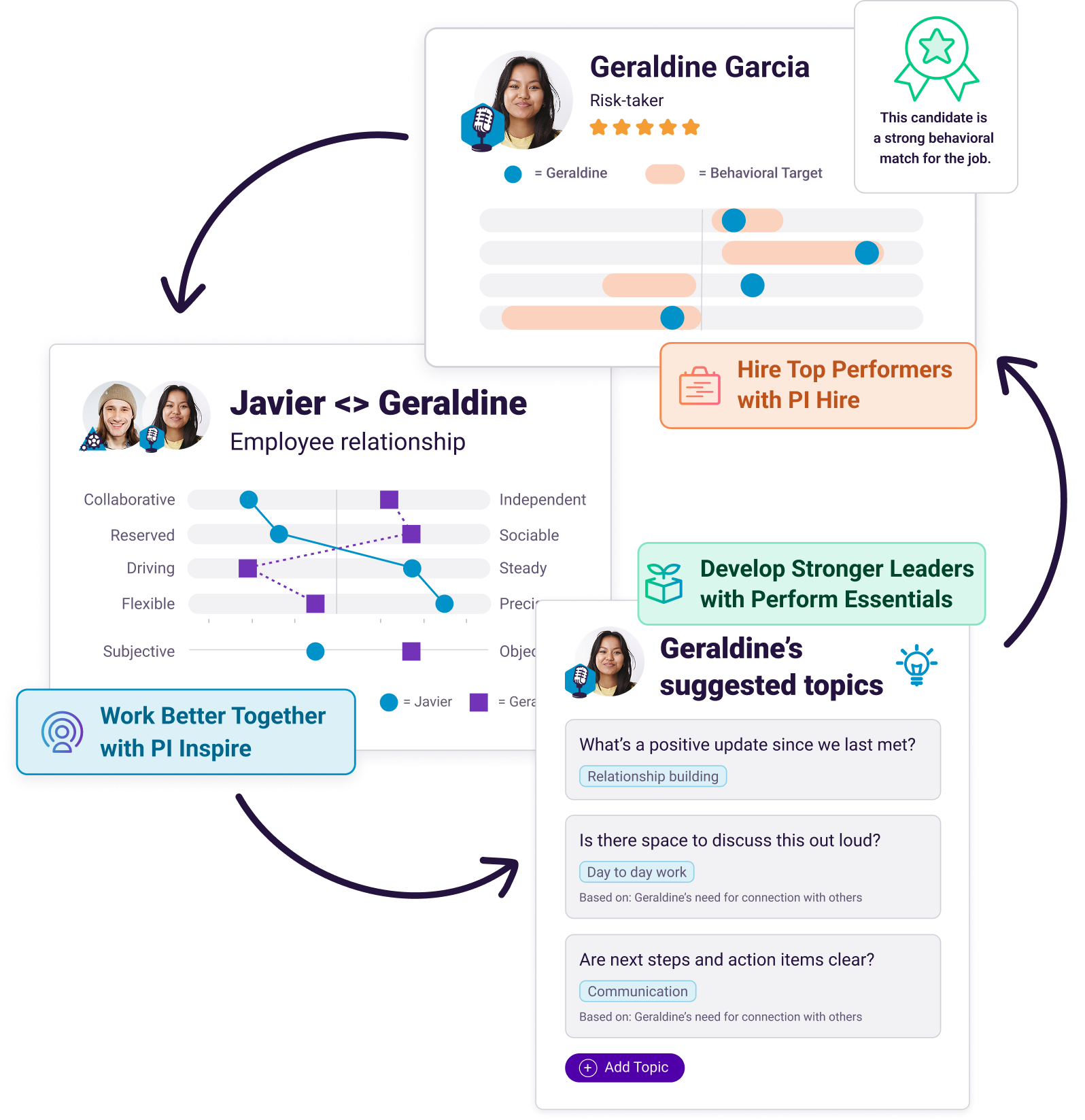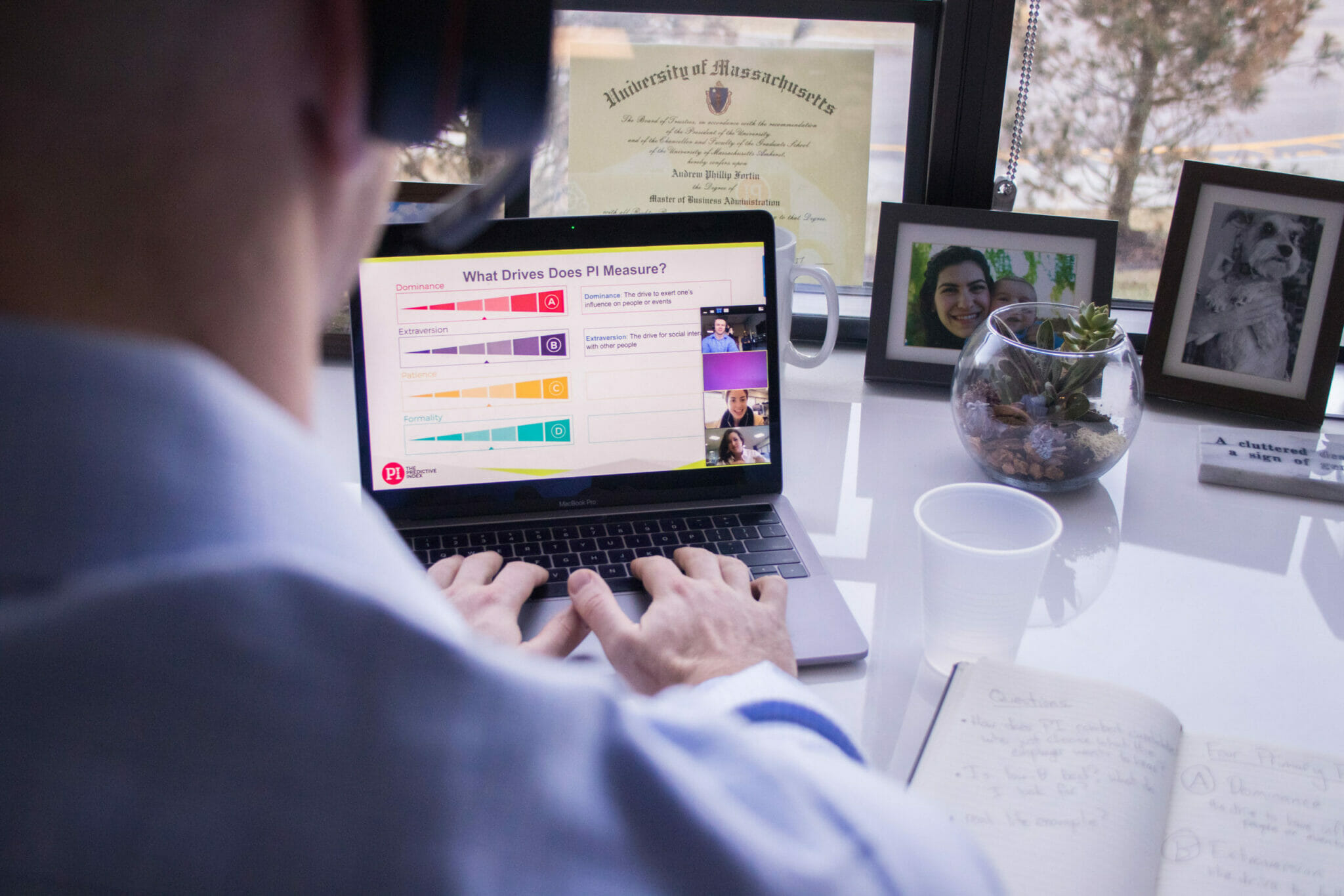While professional development is essential to any healthy workplace, personal goals also both directly and indirectly impact workplace performance. It’s up to managers and HR leaders to support the personal growth goals of their team.
Let’s dig into the benefits of personal growth goals for managers, HR leaders, and employees, as well as six key personal goals that will help your team members shine inside and outside of the workplace.
Benefits of personal growth
The personal growth payoff might differ, depending on a person’s role, tenure, and career aspirations. Everyone’s arc is unique, but in general, certain benefits apply to different subsets of the workforce.
Benefits for managers
Managers are better able to perform their own duties when employees prioritize both personal and professional goals.
The benefits of personal goals for managers include:
- Enhanced employee engagement
- Improved employee morale
- Skills and abilities
- Increased team productivity
- Better team collaboration
- Diverse and well-rounded team members
- Identifying and nurturing future leaders
- A continuous improvement mindset

Integrate PI with your existing workflow
With 97+ integrations, you can keep everything in sync to align your talent strategy with business goals.
Benefits for HR leaders
When employees focus on their personal growth, it has a ripple effect that extends throughout the entire organization.
The benefits of personal goals for HR leaders include:
- Improved talent acquisition
- Enhanced employee retention
- Boosted workplace happiness
- Reduced training costs
- Stronger company culture
- A more adaptable and innovative team
Benefits for employees
The benefits of personal growth goals are the most clear for employees, though they may need to be reminded of the importance of balancing both personal and professional goals, which are both valuable.
The benefits of personal growth goals for employees:
- Increased job satisfaction
- Enhanced skills
- Improved confidence
- Better adaptability
- Increased resilience
- Boosted wellbeing
- Improved relationships
- Enhanced self-awareness
Personal growth plan
A plan for how you’re going to achieve your personal growth goals is just as important as the goals themselves. After all, as Benjamin Franklin famously said, “If you fail to plan, you are planning to fail.”
The best way to hold yourself accountable to your goals is to write them down, set actionable deadlines, and revisit your plan regularly to evaluate your progress.
Learn more with our guide on how to create a personal development plan, which includes a personal development plan example, a template, and four best practices on how to create one.
Personal growth goals for work & life
1. Public speaking
Public speaking is widely known as a most common fear, even ahead of death for some. And the best way to overcome your fear is to confront it head-on.
Therefore, improving public speaking skills is an excellent personal growth goal in and out of the office. It gets people out of their comfort zones, improves a person’s communication skills, and boosts confidence.
If public speaking scares you, start small. You don’t need to jump into giving speeches in front of large crowds. Begin by speaking up in meetings, telling stories at gatherings with friends and family, or giving presentations at work.
Pro tip: Toastmasters International is an organization that provides support, constructive feedback, and opportunities to practice your public speaking.
2. Networking
Networking is a skill that’s helpful for both your personal and professional life. The best networkers put themselves out there, ask engaging questions, listen attentively, and follow up to continue the relationship.
In your personal life, networking can build a larger friend circle, but that also, in turn, can have positive effects on your work life. As the saying goes, it’s not what you know—it’s who you know. You never know, a connection could turn into a customer, job prospect, or source of helpful information.
At work, the benefits are clear. Being able to network helps you find potential customers or clients, business partners, or other professionals within your industry.
Practice asking interesting and engaging questions to get to know people. You’ll also need to put yourself out there by going to traditional networking events or less traditional opportunities like volunteering, joining a club dedicated to a hobby you enjoy, or participating in community events.
Pro tip: Remember and use people’s names. People love to hear their own name, so make an effort to call someone by their name when communicating with them.

3. Writing
Love it or hate it, writing is a workplace skill you can’t escape. While the rise of AI writing tools certainly aids the writing process, being a strong, persuasive writer who knows how to get their point across is a huge asset inside and outside of the workplace. You also can’t rely on spellcheck alone, as these tools make mistakes and can easily misunderstand crucial context.
Improving your writing comes with practice. Keeping a journal is a simple way to practice your writing as it encourages you to express yourself in different ways, especially if done consistently on a daily basis. You can also improve your writing and storytelling abilities through online courses, utilizing creative writing prompts, and asking for constructive feedback.
Pro tip: Even if you’re satisfied with your work or have already used ChatGPT or a similar tool, put your writing through again, asking specifically how you could improve, like “How can my writing be more persuasive?” Or, “How can my writing be more concise?”
4. Mindfulness
Improving your mindfulness helps you stay calm under pressure, enhances focus, and helps you be more present in both your work and personal life. While it may sound simple, the benefits of having better control over your mind can be incredibly powerful.
You can practice mindfulness with short meditation sessions, in which you focus on your breath, the sensations in your body, as well as the sounds around you. If your mind starts to wander, breathe deeply and guide it back to the present moment.
More informally, you can practice being mindful during regular activities like eating. Instead of watching Netflix while you eat, practice mindful eating by focusing on the taste, texture, and smell of your food—without turning to your phone, the TV, or any other distraction.
Pro tip: Concentrate your attention on a single readily available focal point. Trying to be mindful of everything at once is overwhelming, so instead, focus on the gentle rise and fall of your stomach as you breathe.
5. Reading
Reading for education or for fun boosts your critical thinking, empathy, comprehension, vocabulary, knowledge, writing skills, imagination, reduces stress, helps you sleep and so much more! The benefits of reading—in both your personal and professional life—are truly endless.
Instead of turning to social media or your TV to unwind, crack open a book. It doesn’t matter what kind of book it is, just so long as it’s about something you’re interested in—and this is especially true if you’re not in the habit of reading regularly.
Pro tip: Don’t wait. Build reading into your daily routine right now. Even 10 to 15 minutes a day amounts to 60 to 90 hours over the course of a year!
6. Health: Sleep, nutrition, and exercise
The three pillars of health—sleep, nutrition, and exercise—are far too often overlooked, especially for busy business professionals.
A tired, burnt-out, unhealthy body and mind cannot perform at peak efficiency. You may think you don’t have the time for exercise, getting enough sleep, or eating healthy meals, when, in fact, neglecting these things is holding you back personally and professionally.
Health is a broad topic. Zero in on the aspect of your life that needs the most improvement.
Do you need more sleep? Do you need to eat healthier, or do you need more exercise? Build routines around ensuring you meet daily goals. Start small so you don’t give up after a few days.
Pro tip: Track your progress using apps or health wearables, as your consistent improvements will inspire you to keep going.
How vocal should I be about my goals?
There’s tremendous power in sharing your goals. It allows your team to share in the journey with you by supporting you and keeping you accountable. It also enables you to be an inspiring example to your colleagues, showing them that their goals are absolutely within their grasp.
While vulnerability can be scary, it demonstrates authenticity, humility, integrity, and strength—key hallmarks of a leader.
As an HR leader, create a safe space in your organization where employees feel comfortable speaking about personal growth goals and know that the company they work for supports them professionally and personally. Ensure managers have the tools and resources they need to aid their team members in pursuing and fulfilling personal growth goals.
As a manager, help your team members determine the personal growth goals that are most important to them. How can you assist them in their journey and create a trusting rapport that allows them to speak comfortably about their personal goals in one-on-one meetings?
Inspire meaningful development
Employee growth is at the core of what we do at Predictive Index. With PI, managers and HR leaders can gain behavioral insights on employees to manage them better and hold more productive 1:1 meetings to ensure natural talent is recognized while simultaneously encouraging both personal and professional development.
PI Inspire assesses behavioral drives so that you can help your people reach their full potential. Hone strengths inside and outside of the workplace, communicate about goals with ease, and fast-track development. Try it for free or schedule a demo to learn more.








